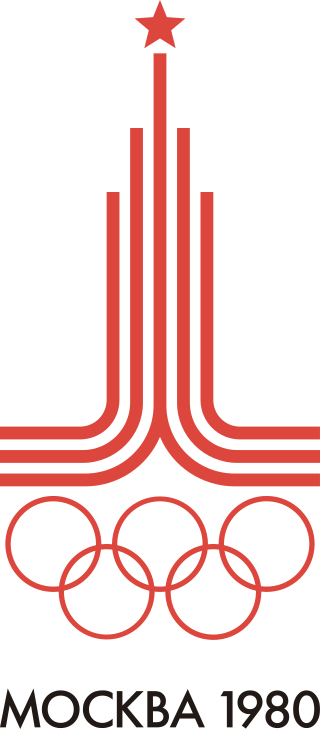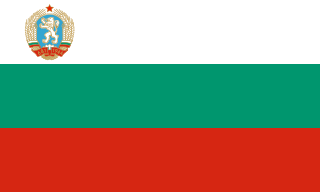
The javelin throw is a track and field event where the javelin, a spear about 2.5 m in length, is thrown as far as possible. The javelin thrower gains momentum by running within a predetermined area. Javelin throwing is an event of both the men's decathlon and the women's heptathlon.

The 1980 Summer Olympics, officially known as the Games of the XXII Olympiad and officially branded as Moscow 1980, were an international multi-sport event held from 19 July to 3 August 1980 in Moscow, Soviet Union, in present-day Russia. The games were the first to be staged in an Eastern Bloc country, as well as the first Olympic Games and only Summer Olympics to be held in a Slavic language-speaking country. They were also the only Summer Olympic Games to be held in a socialist country until the 2008 Summer Olympics held in China. These were the final Olympic Games under the IOC Presidency of Michael Morris, 3rd Baron Killanin before he was succeeded by Juan Antonio Samaranch, a Spaniard, shortly afterwards.

Athletics is a sport that includes athletic contests based on running, jumping, and throwing skills. The name used in North America is derived from where the sport takes place, a running track and a grass field for the throwing and some of the jumping events. Track and field is categorized under the umbrella sport of athletics, which also includes road running, cross country running and racewalking. In British English the term "Athletics" is synonymous with American "Track and Field" and includes all jumping events. Outside of Canada and the United States, Athletics is the official term for this sport with 'track' and 'field' events being subgroups of athletics events.

Theresa Ione Sanderson is a British former javelin thrower. She appeared in every Summer Olympics from 1976 to 1996, winning the gold medal in the javelin throw at the 1984 Olympics. She was the second track and field athlete to compete at six Olympics, and the first Black British woman to win an Olympic gold medal.
Miklós Németh is a Hungarian Olympic champion and former world record holder in the javelin throw. Born in Budapest, he is the son of Imre Németh, who won the Olympic gold in the hammer throw at the 1948 Summer Olympics.

Bulgaria competed at the 1976 Summer Olympics in Montreal, Quebec, Canada. 158 competitors, 105 men and 53 women, took part in 108 events in 14 sports.

Ruth Fuchs was a German politician and athlete. Fuchs, representing East Germany, was the winner of the women's javelin at the 1972 (Munich) and 1976 (Montreal) Olympic Games. She set the world record for the javelin six times during the 1970s.

Klaus Wolfermann is a former West German javelin thrower. He won a gold medal at the 1972 Summer Olympics in Munich and set a world record in 1973.
Marion Becker is a German athlete who competed mainly in the javelin throw.

Uwe Hohn is a retired German track and field athlete who competed in the javelin throw. He is the only athlete to throw a javelin 100 metres or more, with his world record of 104.80 m. A new javelin design was implemented in 1986 and the records had to be restarted, thus Hohn's mark became an "eternal world record". He coached Indian track and field athlete Neeraj Chopra, who won the gold in the men's javelin throw at the 2020 Summer Olympics held in Tokyo.
Ferenc Paragi was a Hungarian athlete who, on 23 April 1980 established a world record of 96.72 meters in the javelin throw, eclipsing the global standard set by fellow countryman Miklós Németh at the 1976 Summer Olympics in Montreal.
The men's javelin throw event at the 1980 Summer Olympics in Moscow, Soviet Union had 18 competitors in one qualifying group. The qualifying round was staged on July 26, with the automatic qualifying mark set at 80.00 metres (262.47 ft). Twelve advanced to the final, which took place the following day.
Seppo Juhani Hovinen is a retired Finnish javelin thrower. A leading favorite in the 1976 Montréal Olympics, he failed to deliver, finishing 7th.

Kara Estelle Winger is an American track and field athlete who competes in the javelin throw. She is the American record holder in the javelin throw with a distance of 68.11 m.
The women's javelin throw event was part of the track and field athletics programme at the 1948 Summer Olympics. The competition was held on July 31, 1948. The final was won by Herma Bauma of Austria.

Trinidad and Tobago competed at the 2012 Summer Olympics in London, United Kingdom from 27 July to 12 August 2012. This was Trinidad and Tobago's most successful Summer Olympics. It was the nation's largest ever delegation sent to the Olympics, with a total of 30 athletes, 21 men and 9 women, in 6 sports. Trinidad and Tobago's participation in these games marked its sixteenth Olympic appearance as an independent nation, although it had previously competed in four other games as a British colony, and as part of the West Indies Federation. The nation was awarded four Olympic medals based on the efforts by the athletes who competed in the track and field. Javelin thrower Keshorn Walcott became the first Trinidadian athlete to win an Olympic gold medal since the 1976 Summer Olympics in Montreal, where Hasely Crawford won for the sprint event. Marc Burns, a four-time Olympic athlete and a relay sprinter who led his team by winning the silver medal in Beijing, was the nation's flag bearer at the opening ceremony.
The Women's javelin throw at the 1952 Olympic Games took place on 24 July at the Helsinki Olympic Stadium. Czech athlete Dana Zátopková won the gold medal and set a new Olympic record.
The Women's discus throw competition at the 1976 Summer Olympics in Montreal was held on 28–29 July.

The javelin throw at the Summer Olympics is one of four track and field throwing events held at the multi-sport event. The men's javelin throw has been present on the Olympic athletics programme since 1908, being the last of the current throwing events to feature at the Olympics after the shot put, discus throw and hammer throw. The women's event was first contested at the 1932 Olympics, becoming the second women's throws event after the discus in 1928.

Combined events at the Summer Olympics have been contested in several formats at the multi-sport event. There are two combined track and field events in the current Olympic athletics programme: a men's decathlon and a women's heptathlon.











